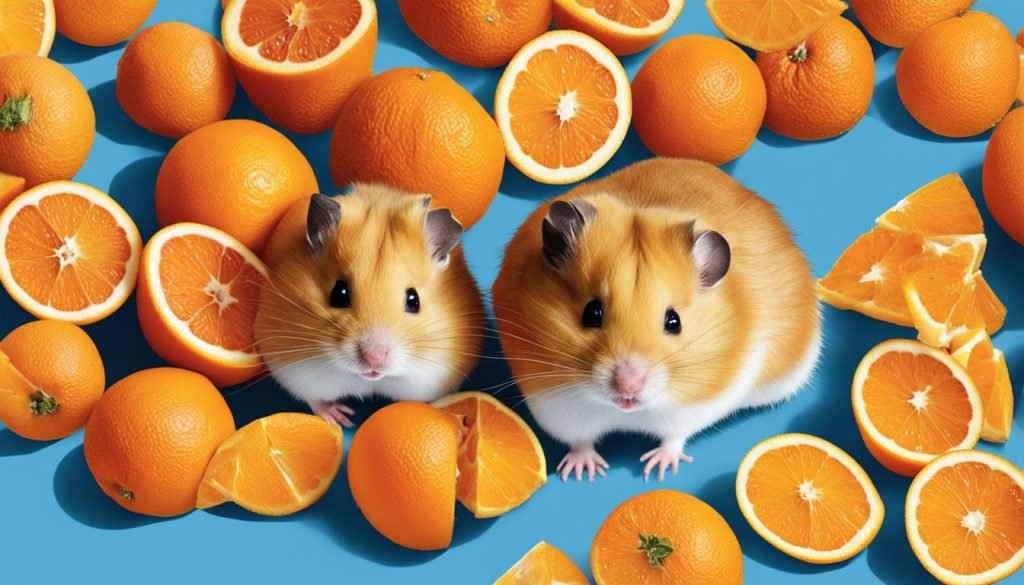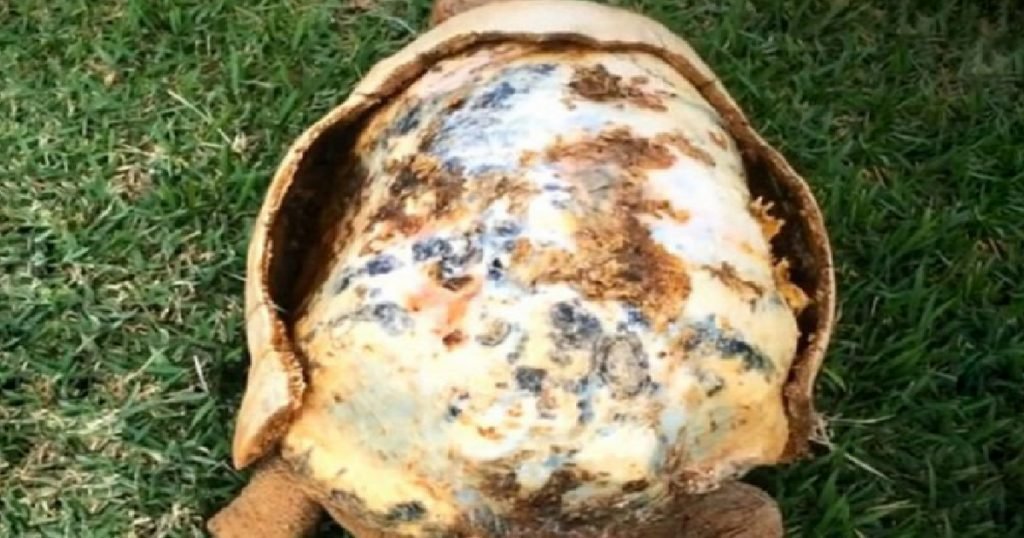Greetings! If you’re a hamster owner, you may have wondered whether it’s safe to feed oranges to your furry friend. In this article, I’ll provide you with all the information you need to know about hamsters and oranges.
So, can hamsters eat oranges? The answer is no. Oranges are not suitable for hamsters to eat. The high acidity of citrus fruits like oranges can cause stomach distress and diarrhea in hamsters. It’s important to avoid feeding oranges or any other citrus fruits to your little companion.
Instead, focus on providing a balanced diet for your hamster. A combination of hamster mix, fresh vegetables, and occasional fruits is the key to a healthy diet. Let’s explore the dietary needs and nutritional requirements of hamsters in more detail.
Can Hamsters Eat Oranges? No, it’s not recommended.
- Oranges are not safe for hamsters to eat due to their high acidity.
- Citrus fruits can cause stomach distress and diarrhea in hamsters.
- Stick to a balanced hamster diet of hamster mix, fresh vegetables, and occasional fruits.
- Safe fruits for hamsters include apples, carrots, squash, blueberries, strawberries, celery, and melon.
- Remember to provide fruits in moderation due to their high sugar content.
Hamster Dietary Needs and Nutrition
As responsible pet owners, it’s important for us to understand the dietary needs of our furry friends. Hamsters, like any other animal, have specific nutritional requirements that need to be met to ensure their overall health and well-being.
When it comes to feeding your hamster, the primary source of nutrition should be a balanced hamster mix. This typically consists of pellets, cracked corn, grains, and seeds. The hamster mix provides essential vitamins, minerals, and protein that your hamster needs to thrive.
In addition to the hamster mix, it is important to supplement your hamster’s diet with fresh fruits and vegetables. These provide important vitamins and minerals that may be lacking in the hamster mix alone.
While a variety of fruits and vegetables can be offered to your hamster, it’s crucial to avoid citrus fruits like oranges. These fruits have high acidity levels that can cause stomach distress and digestive issues in hamsters. It’s best to stick to safe options such as apples, carrots, squash, blueberries, strawberries, celery, melon, and more.
Including a mix of fruits and vegetables in your hamster’s diet not only provides nutritional variety but also adds enrichment to their meals. Remember to introduce new foods gradually and in small amounts to avoid digestive upsets.
Providing a well-balanced diet for your hamster is vital for their overall health. It’s important to cater to their specific dietary needs and ensure they receive all the necessary nutrients. By offering a mix of hamster mix, safe fruits, and vegetables, you can provide a delicious and nutritious diet for your furry friend.
The Potential Risks of Feeding Oranges to Hamsters
Feeding oranges to hamsters may seem like a refreshing treat, but it can come with its share of risks. Due to their high acidity, oranges can cause serious digestive issues in hamsters, including stomach distress and even diarrhea. Additionally, the high sugar content in oranges can contribute to dental problems and rapid tooth degradation in these small pets.
Hamsters have delicate digestive systems, and the acidity of oranges can upset the balance, leading to discomfort and potential health issues. It’s essential to provide a diet that supports their well-being and avoids foods that can cause harm, such as oranges. Opting for hamster-safe fruits and vegetables ensures they receive the necessary nutrients without compromising their health.

Dental health is crucial for hamsters, and feeding them oranges can contribute to dental problems. The high sugar content in oranges can lead to tooth degradation, and the acidic nature of the fruit can further exacerbate dental issues. Over time, untreated dental problems can cause pain and discomfort for hamsters, affecting their overall well-being.
When it comes to hamster diets, it’s important to prioritize their specific nutritional needs and choose foods that support their health. While oranges should be avoided, there are plenty of other safe fruits and vegetables that make suitable treats for hamsters. By providing a balanced and varied diet, you can ensure that your furry friend stays happy and healthy.
Safe Fruits for Hamsters
When it comes to treating your hamster to some delicious fruits, it’s important to choose options that are not only safe but also provide valuable nutrients. While oranges may not be suitable for hamsters due to their high acidity, there are several other fruits that can be given as safe and healthy treats.
Grapes are a popular choice among hamster owners. Not only are they rich in antioxidants, but they also provide hydration. Apples, too, are a great option. Just make sure to remove the seeds and core before offering them to your furry friend. Blueberries and strawberries are also safe fruits that offer a burst of flavor and essential vitamins.
If you’re looking for a juicy and refreshing treat, watermelon is an excellent choice. Hamsters love the high water content of watermelon, and it also helps keep them hydrated. Another tropical option is mango, which provides a dose of vitamin C and fiber.
While these fruits are safe for hamsters, it’s important to remember that moderation is key. Fruits should be given in small amounts as occasional treats, due to their high sugar content. Overindulgence can lead to health issues, so make sure to offer a balanced and varied diet to your hamster, consisting of hamster mix, fresh vegetables, and safe fruits.
One thing to keep in mind is that any uneaten fruit should be removed from the cage after 24 hours to prevent stomach issues. Always prioritize your furry friend’s health and consult your veterinarian if you have any concerns or questions about their diet or overall well-being.
Providing a Healthy Hamster Diet
In addition to hamster mix, it’s important to provide a variety of fresh fruits and vegetables as part of a balanced hamster diet. This ensures that your hamster receives all the necessary nutrients. Fresh vegetables like carrots, broccoli, cauliflower, and cucumbers, as well as fruits like apples and grapes, can be offered as treats. However, citrus fruits should be avoided.
Creating a Comfortable Living Environment for Hamsters
When it comes to keeping your hamster happy and healthy, creating a comfortable living environment is essential. Taking care of their bedding, cage cleanliness, and providing them with toys and entertainment helps ensure their overall well-being.
Choosing Hamster Bedding
Hamsters spend a significant amount of time in their bedding, so it’s important to choose the right type. Opt for bedding made from materials such as paper, wood shavings, or hemp. Avoid cedar shavings as they can cause skin irritations. Additionally, consider providing nesting material like torn-up tissues or plain, unscented toilet paper to create a cozy and secure space for your hamster.
Cleaning the Hamster Cage
Maintaining a clean cage is crucial for your hamster’s health. Regularly clean and replace the bedding to prevent ammonia buildup and foul odors. Pay attention to the corners and hidden spots where bacteria can accumulate. Use mild soapy water to clean the cage and rinse it thoroughly to remove any cleaning residue. Don’t forget to sanitize the water bottle as well.
Providing Toys and Entertainment
Hamsters are active animals and need mental stimulation and physical exercise. Provide them with a variety of toys and entertainment options to keep them engaged and entertained. Simple items like paper towel tubes, plain boxes, and hamster balls can offer hours of fun for your furry friend. Rotate their toys regularly to prevent boredom and stimulate their natural instincts.
By choosing the right hamster bedding, keeping the cage clean, and providing toys and entertainment, you can create a comfortable and enriching living environment for your hamster. Remember, a happy and contented hamster is a healthy hamster.
Taking Care of Hamsters’ Dental Health
When it comes to hamster dental care, there are a few important things to keep in mind. Hamsters’ teeth continuously grow, and they need to chew on hard items to keep their teeth in proper shape. Chewing is not only essential for maintaining dental health but also helps to prevent boredom and keep your hamster entertained.
One way to promote dental health is by providing your hamster with appropriate items for chewing. Paper towel tubes and wooden treats are great options. These items are not only safe for your hamster to nibble on but also help to naturally file down their teeth. Additionally, dog biscuits can be beneficial in keeping your hamster’s teeth short and provide additional calcium for their overall well-being.
If you notice any issues with your hamster’s eating habits or the overgrowth of their teeth, it is important to consult a veterinarian who specializes in small animals. They can assess your hamster’s dental health and may recommend having their teeth professionally trimmed if necessary.
Remember, proper chewing and dental care are vital for your hamster’s overall well-being. By providing appropriate chewing materials and seeking professional help when needed, you can ensure that your furry friend has a healthy and happy smile.

Conclusion
When it comes to the diet of your hamster, it’s crucial to prioritize their health and nutrition. While oranges are non-toxic to hamsters, they should be avoided due to their high acidity and sugar content. These citrus fruits can lead to stomach distress, digestive issues, and dental problems.
Instead, focus on providing a safe and balanced diet for your furry friend. A combination of hamster mix as the main source of nutrition, fresh vegetables, and occasional safe fruits like apples, grapes, and strawberries is recommended. Remember to offer these fruits in moderation due to their high sugar content.
If you have any concerns about your hamster’s diet or overall well-being, don’t hesitate to consult a veterinarian. They can provide expert guidance tailored to your hamster’s specific needs. By following a safe diet and avoiding oranges, you can ensure your hamster’s health and give them the nutrition they need to thrive.
FAQ
Can hamsters eat oranges?
No, oranges are not suitable for hamsters to eat due to their high acidity and potential to cause stomach distress and diarrhea.
Are citrus fruits safe for hamsters?
No, it’s best to avoid feeding hamsters any citrus fruits, including oranges, due to their high acidity and potential to cause digestive issues.
What should hamsters eat?
Hamsters require a balanced diet that includes hamster mix as the main source of nutrition, along with occasional fresh vegetables and safe fruits.
What are some safe fruits for hamsters?
Safe fruits for hamsters include apples, carrots, squash, blueberries, strawberries, celery, and melon, among others. Citrus fruits should be avoided.
How should I provide a healthy hamster diet?
Along with hamster mix, offer a variety of fresh fruits and vegetables in moderation to ensure your hamster receives necessary nutrients. Remove any uneaten fruit after 24 hours to prevent stomach issues.
How should I create a comfortable living environment for my hamster?
Choose suitable bedding, clean the cage regularly, and provide toys and entertainment like paper towel tubes and hamster balls to keep your furry friend happy and active.
How should I take care of my hamster’s dental health?
Provide items like paper towel tubes and wooden treats for chewing to help keep your hamster’s teeth in proper shape. If you notice any issues, consult a veterinarian for professional teeth trimming.
Can hamsters have oranges occasionally?
No, oranges should be completely avoided in a hamster’s diet due to their high acidity, sugar content, and potential to cause stomach and dental problems.








